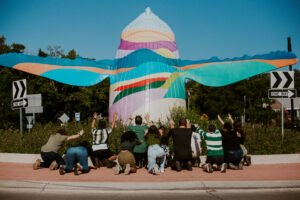SALT LAKE CITY — Each time I’ve been in the historic church that is home to Salt Lake Acting Company (SLAC), I have been charmed by the conversion of the space. The world premiere of Close Encounters in the Beehive, SLAC’s summer satire show, takes place in the smaller upstairs theater where cabaret tables line the front and back of the auditorium. Although SLAC is one of the only two professional theatre companies in Salt Lake City, and by definition is not a community theatre, entering the space on opening night was like entering a festive community gathering. The tables were crowded with audience members and their BYO picnics and drinks. Everyone seemed to know everyone else.
I came to this production—which is a satire of Utah’s predominant culture—with some curiosity from my personal experience as someone with one foot in Utah’s mainstream culture and one foot in its counterculture. It has been said that if imitation is the sincerest form of flattery, then satire is the purest form of criticism. Close Encounters is far more satire than imitation and certainly contains more criticism than flattery of the Beehive State.
I anticipated that the new and original script, written very recently and in a very short amount of time by Olivia Custodio, David Knoell and Penelope Caywood, might be underdeveloped. And although it follows a bit of a trope (aliens come to earth to observe human behavior in order to determine whether humanity is worth saving or if the Earth and its inhabitants should be annihilated), the script is nonetheless clever, tight, well-structured and very funny.
The songs, primarily parodies of Broadway musicals, are smartly written for the most part and well-performed—except in the cases of “Nicest Kids in Town” (original from Hairspray) and “Almost Paradise” (original from Footloose) where the overabundance of words layered with choreography makes the lyrics unintelligible and sometimes loses the jokes. Fortunately, this only occurs occasionally and most of the musical numbers are quite funny. Particular stand outs are “You’re a F**k Up Spencer Cox” (from “You’re a Good Man Charlie Brown”), a searing, sidesplitting roast of Utah’s governor, and two skillfully crafted polyphonic duets, “Someone That’s Greene” (from Little Shop of Horrors’ “Somewhere That’s Green”) and “Beings In the Sky” (from Into the Woods’ “Giants in the Sky”), that were brilliantly interwoven and performed.
Direction and choreography were skillfully done by Cynthia Fleming (who is also SLAC’s executive artistic director) and assistant Hannah Keating. Scenes flow easily, blocking is clean and pacing is tight. Fleming’s skill as a comedic director is evident in scenes such as the Trump/Biden debate with Marc Nielson as Trump and Robert Scott Smith as Biden, which is as timely as it is funny. The digs at the two politicians were served up equally to both politicians and the song “You Gotta Get a Gimmick” (original from Gypsy) is hilarious.

The ensemble cast was quite strong. Joseph Paul Branca stood out as the alien Zeb, whose vocal characterization and singing paired with impeccable comic timing. His physicality is notable even as he maneuvers scene changes with an alien skulk in the half-light. Micki Martinez excels in various roles, and her dance ability is showcased in “The Nicest Kids in Town” and “Holding Out For Kevin Bacon”. But the most notable performance is by Nielson, whose many small roles and superb Spencer Cox and Donald Trump impressions demonstrate a consummate comedic ability.
Technical production values are strong with some fun local homage in the set design (by Erik Reichert) in the whale sculpture (which is the alien’s spaceship) and beautiful projection design by David O. Smith that captures local landscapes and landmarks. Costumes by Alicia Kondrick add their own bit of humor to the production by poking fun at some local clothing quirks. The white t-shirts under strappy prom dresses in the Kevin Bacon scene made me laugh out loud.
The silly show wraps up with a decent message of hope and the human capacity for love and potential to change for the better. However, the show is so focused on satirical criticism that it fails to convince that there is actually much worth saving in the culture and people it examines. Yes, the younger generation that’s presented has some redeeming qualities (mostly because they begin to reject their culture), but the parents aren’t presented as very redeemable. Likewise, though there are nods to the mountains and beauty of Utah, even the most likable aspects of the state aren’t highlighted in a way that shows why people want to live here despite all that is wrong with the place. While the point of the production is to criticize Utah’s quirks and failings (criticism that is deserved and quirks that are absurdly funny to examine), I left the production wishing there was a bit more that highlights the reasons we stay in Utah. This would have made the aliens’ decision to (spoiler alert) not to annihilate the Earth more convincing.
The contrast between the experience at SLAC (which clearly caters to the local counterculture) and other theatre companies that cater to the predominant local culture is stark. From the raffling of a booze-bouquet, to the Jell-O shots passed through the audience on a tray at intermission (in little white paper cups no less), to the profanity, ribaldry, and often brutal mockery of Latter-day Saints, Republicans and all things considered mainstream in Utah, this production is certainly not for everyone. But for those who consider themselves part of Salt Lake’s counterculture and even those fully immersed in the Utah mainstream who have a thick skin, this production is an uproariously good time. Even those mocked in it (here’s looking at you Spencer Cox) should see the show and examine why it might hit hard. In the words of the late great local playwright Eric Samuelson, “See as much theatre as you can, and if a play offends you, see it twice.”
I enjoy productions like Close Encounters that cause introspection and leave me with something to think about. I wish there was more audience crossover between Utah’s theatrical extremes (SLAC on one side, Hale on the other) as I think this would result in greater self-reflection, respect and appreciation for the need for diversity of thought. Diversity of people and experience, together with the capacity for change and love are perhaps the most redeeming qualities of humanity, and that is worth saving.
[box]Salt Lake Acting Company’s production of Close Encounters in the Beehive runs June 26 – August 18 at 168 W 500 N
Salt Lake City. Tickets are $40-50. For more info, visit www.saltlakeactingcompany.org.[/box]
